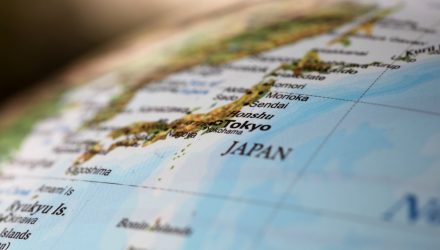Japanese stocks are trailing U.S. rivals this year, with some of that laggard status attributable to a slower roll-out of coronavirus vaccines in Japan.
Still, the WisdomTree Japan Hedged Equity Fund (NYSEArca: DXJ) ranks as one of the more solid developed markets single-country exchange traded funds this year. The currency hedged ETF could be an idea to consider in 2022 as the world’s third-largest economy plays catch-up with the U.S. on the vaccination front.
The lethargy of Japanese equities this year indicates that the country, like other major economies, has coronavirus vulnerabilities. On the other hand, that also says that as vaccination rates increase and hospitalizations and deaths decline, risk assets can rally.
“Countries like Japan—a trade-dependent economy that started off with a slow vaccination rollout—have been more challenged, forcing them to play catch-up to the U.S. recovery,” says WisdomTree analyst Matt Wagoner. “Throughout the spring and summer, large parts of the country were repeatedly thrown into lockdowns to contain the spread of COVID-19. More recently, the Omicron variant has led Japan to close its borders to foreigners, at least for the next month.”
A potential positive for DXJ over the near term is that Japan’s vaccination efforts are starting to pay dividends in the form of more citizens getting the jab. That’s important because Japan is a trade-dependent economy and tourism is a vital economic engine, too.
“Over the past few months, Japan has turned a corner on its vaccination campaign. After starting off as a global laggard, Japan now leads many developed countries on the percentage of its population fully vaccinated. This success should help it avoid the severe lockdowns endured earlier this year,” adds Wagoner.
Another two factors for advisors and investors to consider regarding DXJ are that global professional investors are under-allocated to Japanese stocks, and Japan is trading at deep discounts relative to the S&P 500.
“The average U.S. asset allocator—many of which have a ‘home country bias’—has well over half of its weight in a market that is increasingly more expensive relative to the rest of the world,” notes Wagoner. “MSCI Japan is nearly at its biggest valuation discount relative to the U.S. since 2000.”
Should Japan’s recovery follow a similar path as that seen in the U.S., cyclical value sectors will lead, and that’s to DXJ’s benefit because the fund allocates almost two-thirds of its weight to cyclical value groups.
For more news, information, and strategy, visit the Model Portfolio Channel.
Read more on ETFtrends.com.
The views and opinions expressed herein are the views and opinions of the author and do not necessarily reflect those of Nasdaq, Inc.
www.nasdaq.com
